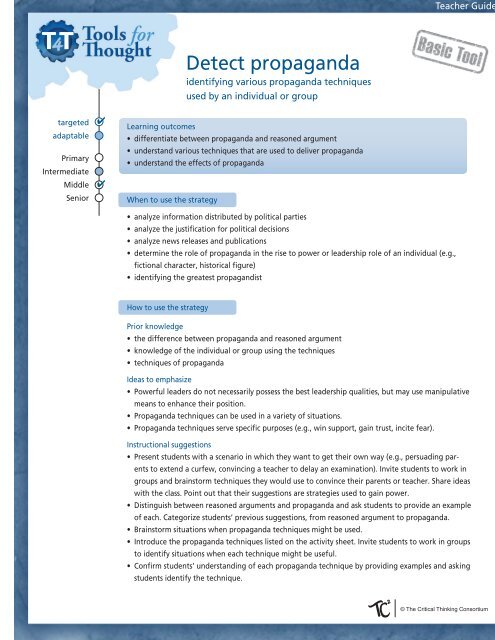Residential Residential
Residential_School
Residential_School
Create successful ePaper yourself
Turn your PDF publications into a flip-book with our unique Google optimized e-Paper software.
Teacher Guide<br />
TT<br />
Detect propaganda<br />
identifying various propaganda techniques<br />
used by an individual or group<br />
targeted<br />
adaptable<br />
Primary<br />
Intermediate<br />
Middle<br />
Senior<br />
4<br />
4<br />
Learning outcomes<br />
• differentiate between propaganda and reasoned argument<br />
• understand various techniques that are used to deliver propaganda<br />
• understand the effects of propaganda<br />
When to use the strategy<br />
• analyze information distributed by political parties<br />
• analyze the justification for political decisions<br />
• analyze news releases and publications<br />
• determine the role of propaganda in the rise to power or leadership role of an individual (e.g.,<br />
fictional character, historical figure)<br />
• identifying the greatest propagandist<br />
How to use the strategy<br />
Prior knowledge<br />
• the difference between propaganda and reasoned argument<br />
• knowledge of the individual or group using the techniques<br />
• techniques of propaganda<br />
Ideas to emphasize<br />
• Powerful leaders do not necessarily possess the best leadership qualities, but may use manipulative<br />
means to enhance their position.<br />
• Propaganda techniques can be used in a variety of situations.<br />
• Propaganda techniques serve specific purposes (e.g., win support, gain trust, incite fear).<br />
Instructional suggestions<br />
• Present students with a scenario in which they want to get their own way (e.g., persuading parents<br />
to extend a curfew, convincing a teacher to delay an examination). Invite students to work in<br />
groups and brainstorm techniques they would use to convince their parents or teacher. Share ideas<br />
with the class. Point out that their suggestions are strategies used to gain power.<br />
• Distinguish between reasoned arguments and propaganda and ask students to provide an example<br />
of each. Categorize students’ previous suggestions, from reasoned argument to propaganda.<br />
• Brainstorm situations when propaganda techniques might be used.<br />
• Introduce the propaganda techniques listed on the activity sheet. Invite students to work in groups<br />
to identify situations when each technique might be useful.<br />
• Confirm students’ understanding of each propaganda technique by providing examples and asking<br />
students identify the technique.<br />
© The Critical Thinking Consortium<br />
95


